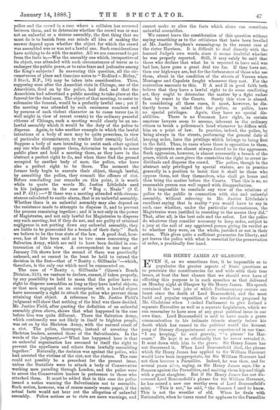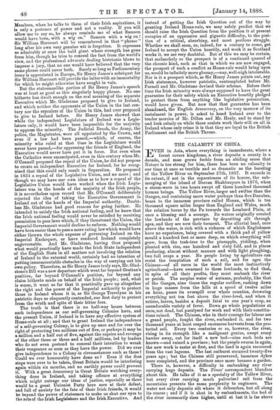SIR HENRY JAMES AT GLASGOW.
EVEN if, as we sometimes fear, it be impossible so to popularise the greater aspects of State questions as to penetrate the constituencies far and wide with their true issues, at least the best chance that we should ever have of effecting this purpose is in such speeches as that delivered on Monday night at Glasgow by Sir Henry James. His speech contained the best joke of which Parliamentary orators can boast since the death of Lord Beaconsfield, and the most lucid and popular exposition of the revolution proposed by Mr. Gladstone when / (asked Parliament to give Ireland a separate Executive as well as a separate Legislature, which we can remember to have seen of any great political issue in our own time. Lord Beaconsfield is said to have made a grave communication to his intimate friends shortly before his death which has caused to the political world the keenest pang of literary disappointment ever experienced in our time. "I am keeping," he said gravely, "'a phrase' for Har- court." He kept it so effectually that he never revealed it. It went down with him to the grave. Sir Henry James has not discovered it. When Lord Beaconsfield died, the phrase which Sir Henry James has applied to Sir William Harcourt would have been inappropriate, for Sir William Harcourt had not then become a Parnellite. Indeed, he was then, and for several years after, raging, as Sir Henry James says, like a Samson against the Parnellites, and smiting them hip and thigh with a great slaughter. But if Sir Henry James has not dis- covered Lord Beaconsfield's phrase for Sir William Harcourt, he has coined a new one worthy even of Lord Beaconsfield's mint. "This is not," he said, "the Samson I used to know. This is not the wrestler of old. When he deals with Nationalists, when he turns round for applause to the Parnellite Members, when he talks to them of their Irish aspirations, it is only a pretence of power and not a reality. If you will allow me to say so, he always reminds me of what Samson would have been, with a wig on." Samson with a wig on Sir William Harcourt will be remembered in that " phrase " long after his own very genuine wit is forgotten. It expresses so admirably at once the bald giant whose strength has gone from him, though he tries to conceal the fact from the world's view, and the professional advocate dealing histrionic blows to impress a jury, that no one would have believed that the very same phrase could cover both. Surely so long as Parliamentary irony is appreciated in Europe, Sir Henry James's sobriquet for Sir William Harcourt will provide the latter with an immortality for which he might otherwise have sought in vain. But the statesmanlike portion of Sir Henry James's speech was at least as good as this singularly happy phrase. No one hitherto has dwelt enough on the real meaning of the separate Executive which Mr. Gladstone proposed to give to Ireland, and which neither the opponents of the Union in the last cen- tury nor the repealers of the Union in this, had over proposed to give to Ireland before. Sir Henry James showed that while the independent Legislature of Ireland was a Legis- lature only, it would have been impossible for the majority to oppress the minority. The Judicial Bench, the Army, the police, the Magistrates, were all appointed by the Crown, and even if a law had been passed,—which, of course, the minority who ruled at that time in the Legislature would never have passed,—for oppressing the friends of England, the Executive would never have put it in force. But even when the Catholics were emancipated, even in this century when Mr.
O'Connell proposed the repeal of the Union, he did not propose to create an independent Executive for Ireland, for he recog- nised that this could only result in Separation. He proposed in 1834 a repeal of the Legislative Union, and no more ; and though we may have our own ideas as to how a repeal of the Legislative Union would have worked when the Irish Legis- lature was in the hands of the majority of the Irish people, it is nevertheless upon record that Mr. O'Connell deliberately rejected the idea of taking the Executive Government in Ireland out of the hands of the Imperial authority. Doubt- less Mr. Gladstone had good reasons for going further. He intended to satisfy the Irish national feeling, and he knew that the Irish national feeling would never be satisfied by receiving permission to pass laws which, if they threatened the Union, the Imperial Government would decline to enforce. Nothing would have been easier than to pass a mere rating law which would have either thrown the whole expense of governing Ireland on the Imperial Exchequer, or have rendered Ireland completely ungovernable. And Mr. Gladstone, having thus proposed what would practically have made the Irish State independent of the English State in all matters not involving the relation of Ireland to the external world, certainly had no intention of putting insurmountable obstacles in the way of carrying out his own policy. Therefore, as Sir Henry James truly says, Mr. Glad- stone's Bill was a new departure which went far beyond Grattan's position, far beyond O'Connell's position, far beyond any claim hitherto made on behalf of the Irish people ; and, what is worse, it went so far that it practically gave up altogether the right and the power of the Imperial authority to protect those in Ireland whom it is, as Sir George Trevelyan in his patriotic days so eloquently contended, our first duty to protect from the wrath and spite of their bitter foes. The truth is that there is no half-way house between such independence as our self-governing Colonies have, and the present Union, if Ireland is to have any effective system of Home-rule at all ; and that to grant Ireland the independence of a self-governing Colony, is to give up once and for ever the right of protecting two millions out of five, or perhaps it may be a million and a half out of five, against the caprice and revenge of the other three or three and a half millions, led by leaders who do not even pretend to conceal their intention to wreak their vengeance as soon as they have the power. Did we ever give independence to a Colony in circumstances such as these ? Could we ever honourably have done so ? Even if the first steps were ever to be taken, Great Britain would be interfering again within six months, and no earthly power could prevent it. With a great democracy in Great Britain watching every- thing done in Ireland, and taking offence at everything which might outrage our ideas of justice, especially as there would be a great Unionist Party here sore at their defeat, and full of anxiety for the fate of their Irish friends, it would be beyond the power of statesmen to make us shut our eyes to the acts of the Irish Legislature and the Irish Executive. And instead of getting the Irish Question out of the way by granting Ireland Home-rule, we may safely predict that we should raise the Irish Question from the position it at present occupies of an oppressive and gigantic difficulty, to the posi- tion of a critical, absorbing, and most perilous struggle. Whether we shall soon, or, indeed, for a century to come, get Ireland to accept the Union heartily, and work it as Scotland works it, we are very doubtful. But of this we may be certain, that melancholy as the prospect is of a continued quarrel of the chronic kind, such as that in which we are now engaged, the prospect of such a conflict as Home-rule would bring upon us, would be infinitely more gloomy,—nay, well-nigh intolerable. Nor is it a prospect which, as Sir Henry James points out, any Irish statesman, however patriotic, contemplated before Mr. Parnell and Mr. Gladstone devised their scheme. Before their time the Irish minority were always supposed to have the great guarantee for their safety which an Executive heartily pledged to protect them from anything like legislative persecution, would have given. But now that that guarantee has been abandoned, the English democracy, on the very morrow of its instalment in power, is asked to hand Ireland over to the tender mercies of Mr. Dillon and Mr. Healy, and to stand by and look calmly on while these zealots work their will on all in Ireland whose only crime it is that they are loyal to the British Parliament and the British Throne.







































 Previous page
Previous page